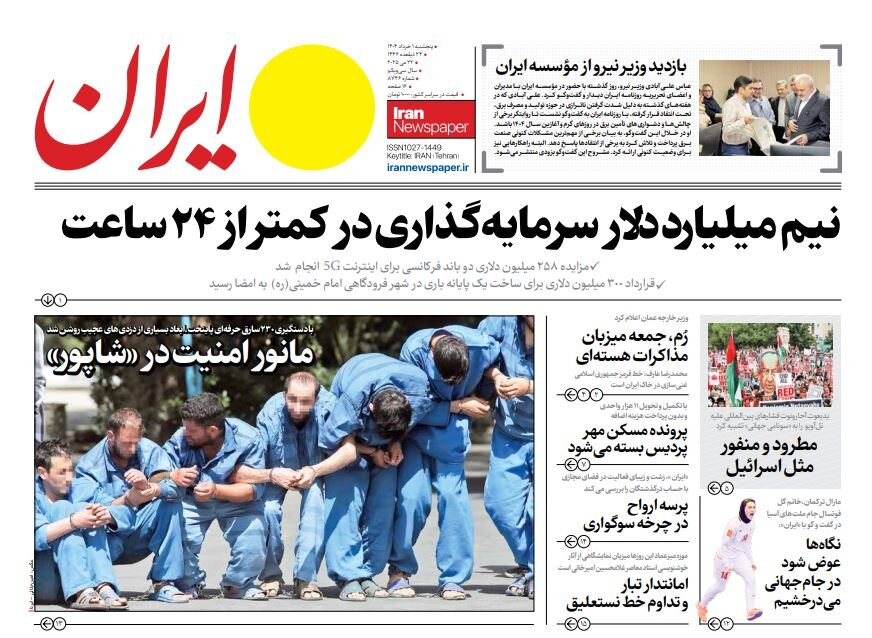Negotiations in line with the policy of engagement with neighbors

TEHRAN - In a commentary, the Iran newspaper discussed the continuation of the Iran-U.S. negotiations and said: Rome once again hosted the fifth round of indirect talks between Iran and the United States mediated by Oman.
The meeting took place while just a few days ago, a verbal dispute broke out between the officials of the two countries; a dispute whose origin was Washington's contradictory and sometimes provocative positions on Iran's right to enrich uranium. According to diplomatic sources, in the past four rounds of negotiations tangible and even innovative ideas were put forward. But now, instead of moving toward agreement, the path seems to be heading toward stagnation. Moreover, according to Araghchi, the importance of the position of neighbors in the foreign policy approach of the Islamic Republic of Iran is very high, and our neighbors are our priority in terms of politics, economics, and culture. Tehran will maintain the policy of engagement with neighbors as the main pillar of its diplomatic doctrine. This approach, especially in an environment where regional tensions are tied to multiple actors in multiple places, can play a key role in redefining the balance.
Siasat-e-Rooz: Denying nuclear technology is a violation of people’s right
In a note, Siasat-e-Rooz addressed the inhuman nature of the international system and wrote: The fate of the negotiations between Iran and the United States on the nuclear issue and sanctions removal has degenerated into a state of great uncertainty. According to a report by Alena Douhan, Special Rapporteur on the Negative Effects of Unilateral Coercive Measures in 2022, the effects of the sanctions on the Iranian people, contrary to the U.S. claim, have been extensive, in violation of human rights and all international laws and regulations. The U.S. call on Iran to fully eliminate its nuclear enrichment program is also inhumane, especially as nuclear technology is imperative in medical treatment, food supply, and other basic things, and, therefore, the U.S. call is a violation of this right. The behavior of the self-proclaimed human rights advocates, including Western countries, reflects the inhuman nature of the international system. Such an approach does not even adhere to its own human rights laws and claims, and prefers its interests over the lives of millions of people.
Jam-e-Jam: Regional ties progressing well
Jam-e-Jam discussed Iran's relations with its neighbors in an interview with Dr. Ali Bagheri, Secretary of the Strategic Council for Foreign Relations. He said: Iran's relations with neighboring countries under the 13th government have entered a new chapter; the neighborhood policy has practically not allowed any gap to remain between Iran and these countries in the region so that enemies can create a distance between neighbors at the regional level. In this period, we are facing very new conditions, and this situation is very promising. This alignment and synergy between the countries in the region are progressing well. The regional countries' acceptance of Iran's regional role should be considered a sign of the effectiveness of the neighborhood policy. However, our neighboring countries have different relations with countries outside the region, and some countries are simply pursuing their goals at the regional level, which, in certain cases, contradict the collective interests of the countries in the region. The Islamic Republic of Iran’s approach to strengthening its neighborhood policy has led other countries to conclude that they must take a new look at regional relations; and strengthening regional ties can be a platform for securing and guaranteeing national interests.
Ettelaat: Don’t expect economic solutions with this policy!
Ettelaat spoke with economist Kamran Nadri about the extent of the impact that the Palermo ratification could have on the foreign exchange market. He said: The conditional ratification of Palermo will not have much impact on the foreign exchange market for now. The economic environment, especially the foreign exchange market, is 100 percent influenced by the foreign policy doctrine. Therefore, as long as we do not fully accept the FATF and do not have foreign investment and economic interaction with the world, we cannot expect economic solutions. As long as the fate of the sanctions is not determined and these limited trade exchanges are carried out by evading the sanctions, we cannot expect a breakthrough. When macro-decisions and policies are made without considering economic conditions and constraints, the Central Bank or the Planning and Budget Organization cannot manage the market based on economic calculations. The country's economy is often a victim of political manipulation, and as long as economic development is not a top priority at the highest levels of governance, economic improvement cannot be expected.
Leave a Comment